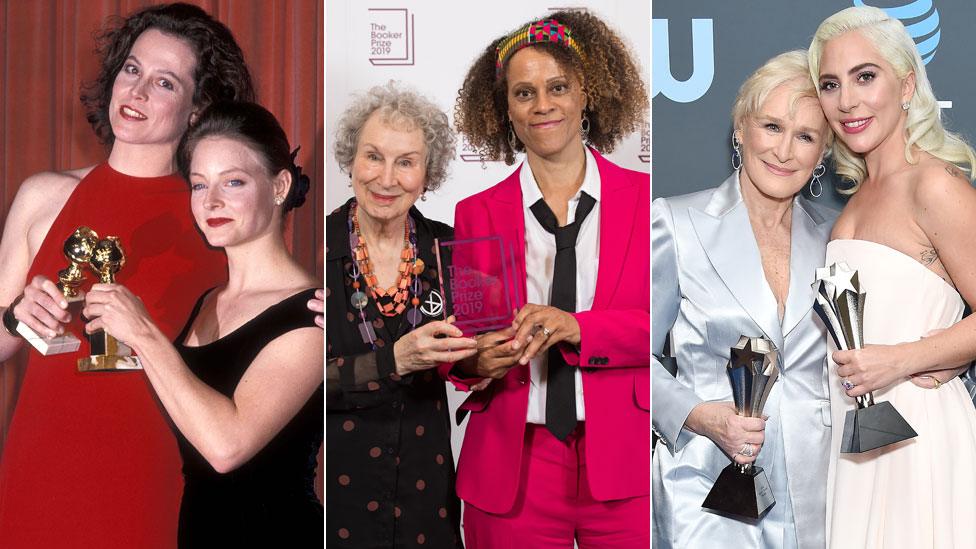Turner Prize 2019: Are award winners and losers going out of fashion?
- Published
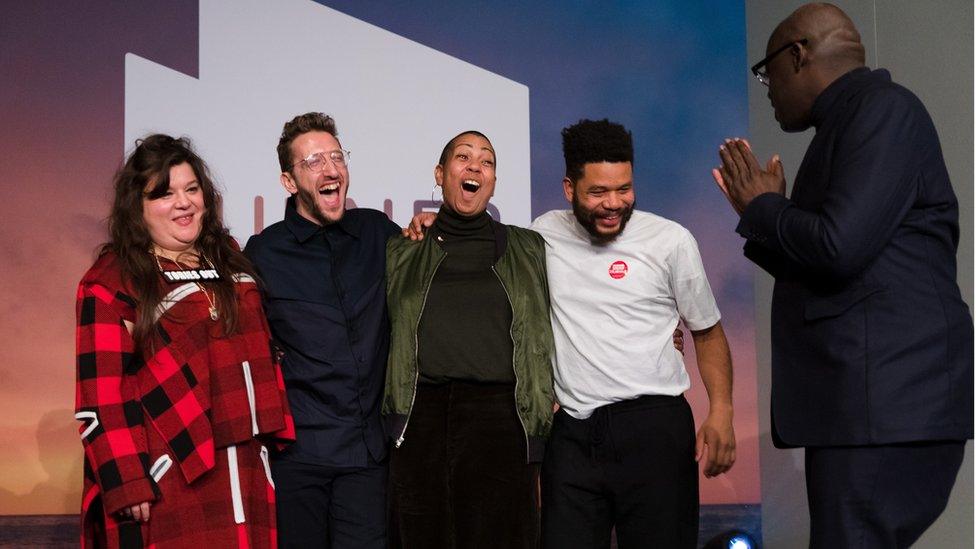
Vogue editor Edward Enninful (right) awarded the 2019 Turner Prize to the four nominees
"It's a crazy contest between an orange and a spaceship and a potted plant and a spoon - which one do you like better?"
That's how singer Anohni, formerly of Antony of the Johnsons, summed up awards in 2005.
She had just won the Mercury Music Prize, external, but was suggesting it was faintly ridiculous to pit very different artistic works against one another for the sake of a trophy.
The 2019 Turner Prize was a crazy contest between human effigies and a futuristic feminist city and a film about Northern Ireland and a sound installation about Syria.
So, before Tuesday's prize-giving ceremony, the nominees got together and decided they didn't want an individual winner to be chosen, instead asking the judges to let them share the coveted art award.
That wasn't just because it was so hard to compare their works, but because they wanted to make a show of unity in divisive times, and didn't want one nominee's political message to be judged as more worthy than the rest.
There had never been a tie for the Turner Prize before. But the prize has changed since the headline-making days of the mid-1990s. Out have gone the indulgent, attention-grabbing sensations by Damien Hirst and Tracey Emin, and in have come the socially conscious, message-driven works of recent years.
The gesture and the reasons behind it have been warmly received. But now this precedent has been set, will next year's nominees feel they need to do the same thing?
And after the Booker Prize judges failed to choose one winner this year, is the notion of competition in the arts going out of fashion?
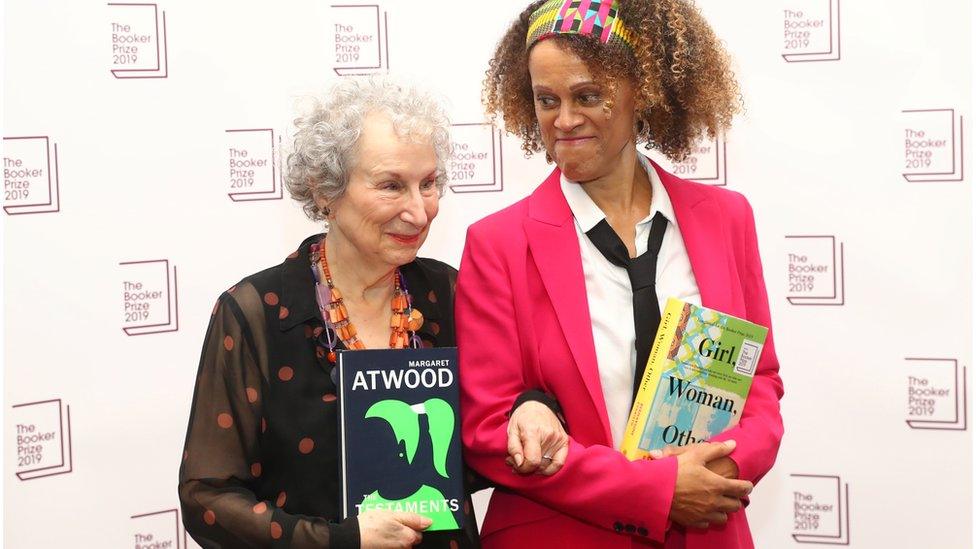
Margaret Atwood and Bernardine Evaristo shared the Booker Prize
"Everyone agrees that competition is the enemy of art," wrote Charlotte Higgins in the Guardian, external after the Booker in October. "And yet, on the whole, there is also an agreement to conspire in the notion that it isn't."
After all, a competition brings a certain amount of excitement and attention that wouldn't have been there otherwise - if, for example, the Turner Prize was just another group exhibition.
BBC arts editor Will Gompertz said: "Maybe annual awards like the Turner Prize and the Booker Prize, which also didn't have a single winner this year, are reaching their sell-by date: an anachronism from a bygone binary age of winners and losers."
But Turner Prize head judge Alex Farquharson, who runs Tate Britain, told BBC News that Tuesday's result was "very specific to this year", and that the award had always evolved in order to stay relevant.
Here are four more recent examples of when artists or judges have decided to share the love - and one where they withheld their love altogether.
Turner Prize 2016
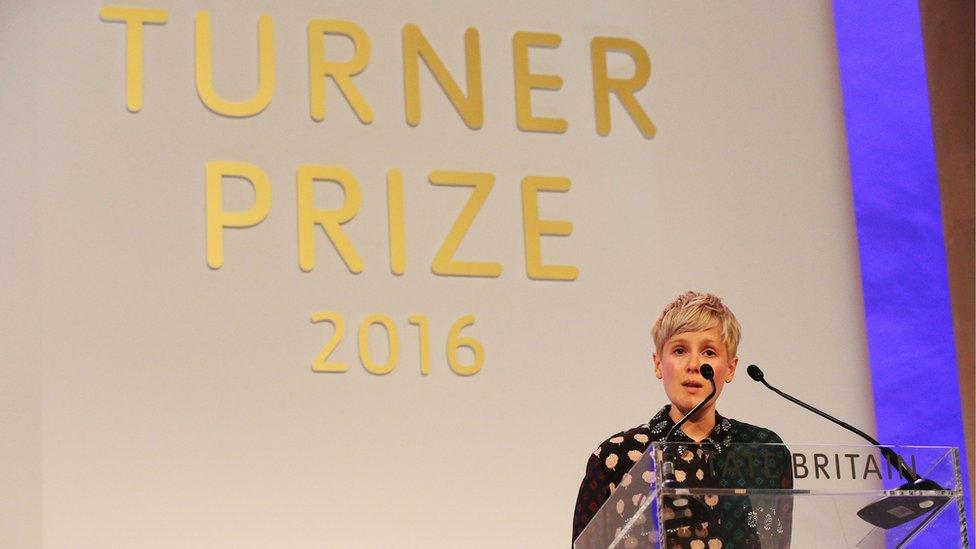
Helen Marten said the art world should show "an egalitarian platform of democracy"
Until this year, the closest the Turner Prize had come to a split award was when the 2016 winner, sculptor Helen Marten, decided to share her prize money (if not the prize itself) with her fellow nominees.
"Promoting a hierarchy is never the most useful thing for anyone involved, or the public," she told BBC News at the time.
Her Turner win came just three weeks after she did the same thing with the £30,000 prize money from her win at the inaugural Hepworth Prize, after which she said art was "deeply subjective".
"To a certain extent I believe in light of the world's ever lengthening political shadow that the art world has a responsibility, if not to suggest a provisional means forward, then at least show an egalitarian platform of democracy," she told BBC Radio 4's Front Row.
Marten was following the example of the winner of the 2015 Artes Mundi prize, the Chicago artist Theaster Gates, who announced he was sharing his £40,000 prize with the nine other shortlisted artists.
James Tait Black Prize for Fiction 2019
Billed as Britain's longest running literary awards, the James Tait Black Prizes recognise the best fiction and biography books of the year. Olivia Laing won the fiction award in August for her debut novel Crudo, and said she would share the £10,000 prize with her fellow nominees.
"I said in Crudo that competition has no place in art and I meant it," Laing told the awards ceremony, according to the Guardian, external.
"Crudo was written against a kind of selfishness that's everywhere in the world right now, against an era of walls and borders, winners and losers. Art doesn't thrive like that and I don't think people do either.
"We thrive on community, solidarity and mutual support and as such, and assuming this is agreeable to my fellow authors, I'd like the prize money to be split between us, to nourish as much new work as possible."
Booker Prize 2019
It was the judges rather than the nominees who decided to split this year's Booker Prize between Margaret Atwood and Bernardine Evaristo.
The Booker rules say the prize must not be divided, but the judges insisted they "couldn't separate" the two works. Peter Florence, the chair, said: "It was our decision to flout the rules."
He twice told organisers the judges wanted to declare a tie, and twice the organisers said no. The third time, the organisers relented. "We tried voting, it didn't work," Florence said. "There's a metaphor for our times."
But the decision was criticised by many, with some suggesting Evaristo would have benefited from having the spotlight to herself, whereas Atwood didn't need it.
One of the judges was writer Afua Hirsch, who said the panel struggled to judge "the titanic career" of Atwood against "the quality and consistency" of Evaristo. That also raised hackles, because they were supposed to be judging individual novels, rather than careers.
"The outcome would always be imperfect, because it was an impossible task," Hirsch wrote in the Guardian, external.
Bad Sex in Fiction Award 2019
The Literary Review's tongue-in-cheek award for the most toe-curling descriptions of sex spoofed the Booker this year by also declaring a tie. Didier Decoin and John Harvey shared the dubious honour.
"We tried voting, but it didn't work," the judges said. "We tried again. Ultimately there was no separating the winners.
"Faced with two unpalatable contenders, we found ourselves unable to choose between them. We believe the British public will recognise our plight."
Bollinger Everyman Wodehouse Prize 2018
The judges of the Wodehouse Prize for Comic Fiction had a different problem in 2018 - they decided none of the nominees were good enough to win. So the award was withheld.
"We did not feel than any of the books we read this year incited the level of unanimous laughter we have come to expect," judge David Campbell said.
A statement said there were "many amusing and well-written books", but "none fulfilled the criteria of making all of the judges laugh out loud".

Follow us on Facebook, external, or on Twitter @BBCNewsEnts, external. If you have a story suggestion email entertainment.news@bbc.co.uk, external.
- Published4 December 2019
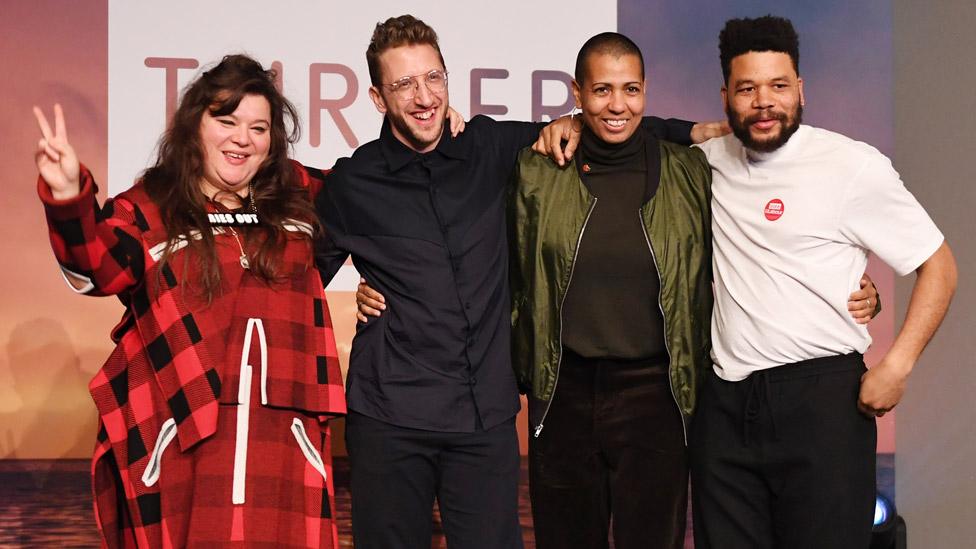
- Published15 October 2019
